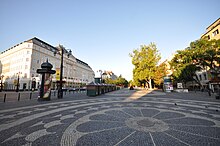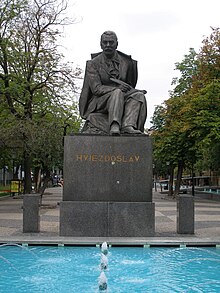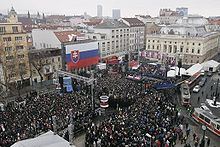Hviezdoslavovo námestie (Bratislava)



Hviezdoslavovo námestie (literally Hviezdoslav Square) is one of the best-known squares in Bratislava. It is located in the Old Town, between the New Bridge and the Slovak National Theatre. The square is named after Pavol Országh Hviezdoslav.
History
This square's names were earlier:[1] (Template:Lang-hu-Template:Lang-de, Template:Lang-hu-Template:Lang-de, Template:Lang-hu-Template:Lang-de)
This square existed in the Kingdom of Hungary for 1000 years.[citation needed] Many of medieval houses were built here. Northern part of this square there are Kőszeghy, Eszterházy,Széchen, Stáhl, Záborszky, Pálffy, Sulkovszky Maldeghem, Malatinszky, Werner houses and southern part of square there are Spineger, Gervay, Löw-Palugyay, Kozics, Wigand, Adler, Pollák, Sprinzl houses.[2] The most notable buildings are the Notre Dame cloister and today's Slovak National Theatre which can be found in the eastern part of square. Earlier the most important noblemen sent their daughters to learn in this cloister, for example: Pálffy, Forgách, Harrach, Lichtenstein.
On 17 March 1848 the Hungarian national leader, Lajos Kossuth proclaimed from Hotel Zöldfa (literally : Greenwood)'s balcony: "Hungary's reborn" to the assembling mass at this square because Ferdinand V signed March laws at the Primate's Palace last day.[3] First Hungarian fancing school's practising hall also worked here.[4] Lajos Kossuth, Franz Joseph, Albert Einstein and Alfred Nobel stayed at this hotel too. This hotel was today's Hotel Carlton's place.[5]
In 1911 Sándor Petőfi's sculpture was erected opposite today's Slovak National Theatre. However it was unsuccessfully attacked with dynamite after the Czechoslovak army occupied the city in 1918.[6][7] After this sculpture was boarded over round temporarily until its removal.[8]
The square underwent major reconstruction at the end of the 20th century. Before reconstruction, it looked like a small city park; now it looks like a city promenade.
On February 24, 2005 US President George W. Bush gave a public speech in Hviezdoslav Square during his visit to Bratislava for the Slovakia Summit 2005 with the president of Russia Vladimir Putin.
Configuration of the square
The square is primarily a pedestrian zone with lots of green, with a podium in the central part for cultural events, and two parallel fountains running along the square. Close to the theatre is the larger-than-life-sized statue of Hviezdoslav.
Important buildings near the square

Probably the best-known building is the old headquarters of the Slovak National Theatre (opera). On the southern side are the Radisson Blu Carlton Hotel, as well as the German and American embassies. On the northern side are many bars and restaurants.
48°08′30″N 17°06′30″E / 48.14167°N 17.10833°E
References
- ^ Erzsébet Varga, "Pozsony", p. 74 (Hungarian)
- ^ Tivadar Ortvay, "Pozsony város utcái és terei", p. 283 (Hungarian)
- ^ Erzsébet Varga, "Pozsony", p. 15 (Hungarian)
- ^ Tivadar Ortvay, "Pozsony város utcái és terei", p. 303 (Hungarian)
- ^ Erzsébet Varga, "Pozsony", p. 75 (Hungarian)
- ^ "A vándorló Petőfi". Madách-Posonium Kft. n.d. Retrieved July 20, 2008.
- ^ Ferenc Keszeli, "Pozsony... Anno... Századfordulós évtizedek, hangulatok képes levelezõlapokon ", p. 122, p. 150, p. 154 (Hungarian)
- ^ Ferenc Keszeli, "Pozsony... Anno... Századfordulós évtizedek, hangulatok képes levelezõlapokon ", p. 150, p. 154 (Hungarian)
Bibliography
- Keszeli, Ferenc (2004). Pozsony… Anno… Századfordulós évtizedek, hangulatok képes levelezõlapokon (in Hungarian) (1st ed.). Pozsony: Méry-Ratio. ISBN 80-88837-49-9.
- Varga, Erzsébet (1995). Pozsony (in Hungarian) (1st ed.). Pozsony: Madách-Posonium. ISBN 80-7089-245-5.
- Ortvay, Tivadar (1991). Pozsony város utcái és terei (in Hungarian) (reprint ed.). Budapest: Püski Kiadó Kft. ISBN 963-7845-65-8.
